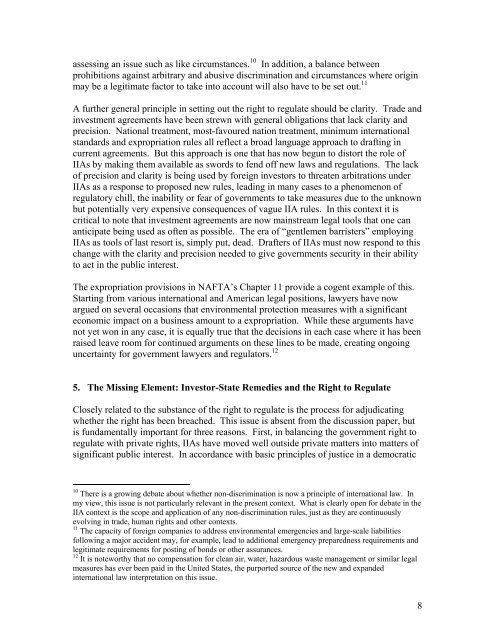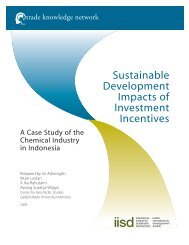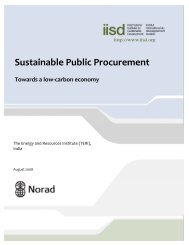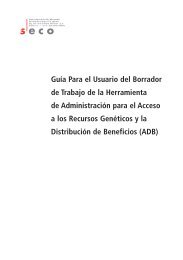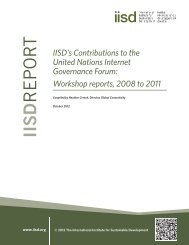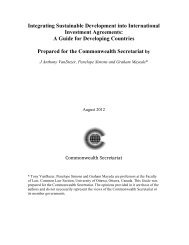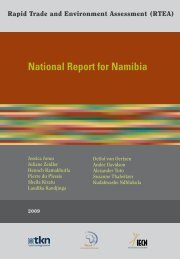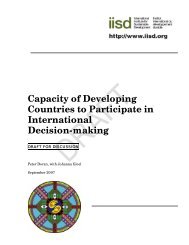The Right of States to Regulate and International Investment Law
The Right of States to Regulate and International Investment Law
The Right of States to Regulate and International Investment Law
You also want an ePaper? Increase the reach of your titles
YUMPU automatically turns print PDFs into web optimized ePapers that Google loves.
assessing an issue such as like circumstances. 10 In addition, a balance between<br />
prohibitions against arbitrary <strong>and</strong> abusive discrimination <strong>and</strong> circumstances where origin<br />
may be a legitimate fac<strong>to</strong>r <strong>to</strong> take in<strong>to</strong> account will also have <strong>to</strong> be set out. 11<br />
A further general principle in setting out the right <strong>to</strong> regulate should be clarity. Trade <strong>and</strong><br />
investment agreements have been strewn with general obligations that lack clarity <strong>and</strong><br />
precision. National treatment, most-favoured nation treatment, minimum international<br />
st<strong>and</strong>ards <strong>and</strong> expropriation rules all reflect a broad language approach <strong>to</strong> drafting in<br />
current agreements. But this approach is one that has now begun <strong>to</strong> dis<strong>to</strong>rt the role <strong>of</strong><br />
IIAs by making them available as swords <strong>to</strong> fend <strong>of</strong>f new laws <strong>and</strong> regulations. <strong>The</strong> lack<br />
<strong>of</strong> precision <strong>and</strong> clarity is being used by foreign inves<strong>to</strong>rs <strong>to</strong> threaten arbitrations under<br />
IIAs as a response <strong>to</strong> proposed new rules, leading in many cases <strong>to</strong> a phenomenon <strong>of</strong><br />
regula<strong>to</strong>ry chill, the inability or fear <strong>of</strong> governments <strong>to</strong> take measures due <strong>to</strong> the unknown<br />
but potentially very expensive consequences <strong>of</strong> vague IIA rules. In this context it is<br />
critical <strong>to</strong> note that investment agreements are now mainstream legal <strong>to</strong>ols that one can<br />
anticipate being used as <strong>of</strong>ten as possible. <strong>The</strong> era <strong>of</strong> “gentlemen barristers” employing<br />
IIAs as <strong>to</strong>ols <strong>of</strong> last resort is, simply put, dead. Drafters <strong>of</strong> IIAs must now respond <strong>to</strong> this<br />
change with the clarity <strong>and</strong> precision needed <strong>to</strong> give governments security in their ability<br />
<strong>to</strong> act in the public interest.<br />
<strong>The</strong> expropriation provisions in NAFTA’s Chapter 11 provide a cogent example <strong>of</strong> this.<br />
Starting from various international <strong>and</strong> American legal positions, lawyers have now<br />
argued on several occasions that environmental protection measures with a significant<br />
economic impact on a business amount <strong>to</strong> a expropriation. While these arguments have<br />
not yet won in any case, it is equally true that the decisions in each case where it has been<br />
raised leave room for continued arguments on these lines <strong>to</strong> be made, creating ongoing<br />
uncertainty for government lawyers <strong>and</strong> regula<strong>to</strong>rs. 12<br />
5. <strong>The</strong> Missing Element: Inves<strong>to</strong>r-State Remedies <strong>and</strong> the <strong>Right</strong> <strong>to</strong> <strong>Regulate</strong><br />
Closely related <strong>to</strong> the substance <strong>of</strong> the right <strong>to</strong> regulate is the process for adjudicating<br />
whether the right has been breached. This issue is absent from the discussion paper, but<br />
is fundamentally important for three reasons. First, in balancing the government right <strong>to</strong><br />
regulate with private rights, IIAs have moved well outside private matters in<strong>to</strong> matters <strong>of</strong><br />
significant public interest. In accordance with basic principles <strong>of</strong> justice in a democratic<br />
10 <strong>The</strong>re is a growing debate about whether non-discrimination is now a principle <strong>of</strong> international law. In<br />
my view, this issue is not particularly relevant in the present context. What is clearly open for debate in the<br />
IIA context is the scope <strong>and</strong> application <strong>of</strong> any non-discrimination rules, just as they are continuously<br />
evolving in trade, human rights <strong>and</strong> other contexts.<br />
11 <strong>The</strong> capacity <strong>of</strong> foreign companies <strong>to</strong> address environmental emergencies <strong>and</strong> large-scale liabilities<br />
following a major accident may, for example, lead <strong>to</strong> additional emergency preparedness requirements <strong>and</strong><br />
legitimate requirements for posting <strong>of</strong> bonds or other assurances.<br />
12 It is noteworthy that no compensation for clean air, water, hazardous waste management or similar legal<br />
measures has ever been paid in the United <strong>States</strong>, the purported source <strong>of</strong> the new <strong>and</strong> exp<strong>and</strong>ed<br />
international law interpretation on this issue.<br />
8


